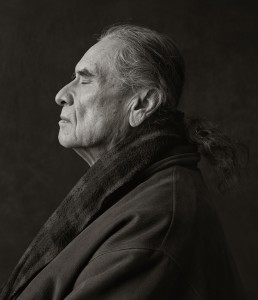S1: Episode 15 - Mario Aguirre

Episode Information
Narrator: Welcome to my Heart is Not Blind. Narrative histories about blindness and perception. A traveling exhibition and book published by Trinity University Press, supported by Kronkosky Charitable Foundation, edited and hosted by Michael Nye. Stories are often found, resting along the edges of surprise and revelation. Every person, every place is a map to somewhere else. Episode 15, Mario Aguire.
Mario: My name is Mario Aguire, and I’m 69, and I’m a pilgrim journeying through this human condition. I was born in the time of segregation and into a very racist part of West Texas. When I entered first grade, I could not speak English, not a word. So I was lost, and the students were all brown faces. The teachers and administration were all white. And I was terrorized by a teacher named Mrs. Orange. I was afraid to go to class, and so I didn’t go to school. I played hooky and, and one day led to two days. A hooky a week led to two weeks, three weeks, a month, I would hide and I’d befriended a little boy, and I would stay with him and his mom. But finally, I was caught and my parents were notified. In my senior year in high school, my eye condition was finally diagnosed as macular degeneration. And it, it felt like a stab to the heart. There was nothing they could do for me. It was a life sentence. The message I heard was, you’re gonna be blind from now on.
To be blind in this human condition is to suffer. My first half of life was an enormous struggle in my inability or unwillingness to accept my existential condition. And, and, uh, it was, it was horrible. It was extremely painful. But what really became a real turning point was when I enter into union analysis and early on in my analysis, I, I had a dream and the dream spoke to me. Yes, you are losing your outer vision, but in its place, you are gaining a different kind of inner vision that enables me to see deep into a person’s energy self. I can, I can see it in colors.
I, I see these colors outside of myself like you would, for example, one of the most prominent colors of energy that I see is a color red, especially with survivors of trauma who’ve been deeply, deeply wounded. Another very prominent color that I can see is green, and green is the color of the heart. A friend of mine bought a, an old Adobe house in this canyon in, uh, New Mexico near the border. It was incredibly quiet, and I used to love to go outside and listen to the wind blowing through the trees. I mean, the wind spoke to me. It was just the wind had this quality of sound and voice to feel that presence of the desert. And with the Apache spirits there, blindness does not make a person less whole. There is enormous fear. And, and that fear leads to, to ignorance and often lack of really compassion. I think in a more enlightened society and perhaps in a more enlightened time, blindness could be appreciated as a door to a deeper perception and understanding of, of reality.
I work at rape crisis center, working with survivors of sexual trauma. I feel sometimes so much compassion that I weep at the slightest news of other people’s pain in sorrows. I think listening is, is a rare quality. In fact, Carl Young, he believed that listening is such a rare quality that people have to pay for it. I listen with my heart. Young psychology teaches that we live in a paradoxical world. That is a world where there’s this interplay of opposites, and I think that way and, and I perceive life in terms of this interplay of opposites. So yeah, if you lose something, you gain something. If you gain something, you lose something. There’s light and darkness and some darkness and light.
Host: Mario’s father is blind. His younger sister and aunt are blind, all on his father’s side of the family, macular retinal degeneration. Mario asked himself, who am I? Well, he said, “I’m a husband. I’m a therapist. I’m a blind person. I’m a Chicano, I’m a Buddhist, and I’m a child of the universe.” He said, “It was Buddhism and Jungian therapy that helped me finally, finally, embrace my limitations. Embrace my existential companion.” Mario has worked 20 years at a rape crisis center as a therapist, helping survivors of sexual trauma. He said, “I think listening is a rare quality. There’s a certain amount of risk involved in listening. The risk is what you might hear could change you.” Mario reminds us that listening is an act of kindness. To be deeply listened to, can be very healing.
Join us next week. Two new episodes will be released. Please subscribe, rate, and review this podcast. You can also go to my website, michaelnye.org/podcast. For portraits and transcripts. There are so many ways, different ways to experience moments to their fullest. Thank you for listening.
